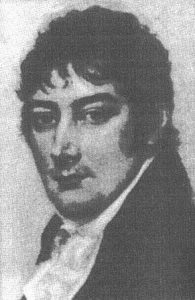Scion of one of the great rice planting families of Georgetown District, Joseph Alston was born ca. 1778, the son of William “King Billy” Alston and Mary Ashe. Educated by private tutors, Alston attended the College of Charleston from 1793 to 1794. In 1795 he entered the junior class of the College of New Jersey (later Princeton), but withdrew before graduating. Alston studied law under Edward Rutledge, who predicted a brilliant future for his pupil. Admitted to the bar in 1799, Alston practiced only occasionally, devoting his career to the management of his extensive rice plantations in All Saints Parish, comprising 6,287 acres and 204 slaves.

Alston
On February 2, 1801, Alston married Theodosia Burr, daughter of Vice President Aaron Burr. The couple’s only child, Aaron Burr Alston, died at the age of ten on June 30, 1812. A short time later, Theodosia, after departing Georgetown aboard the schooner Patriot on December 30, 1812, was lost at sea off the coast of North Carolina.
Although unambitious, Alston entered politics at the insistence of his father-in-law. He was a member of the S.C. House of Representatives from 1802 to 1812, serving as Speaker of the House from 1805 to 1809, the youngest man to hold the office up to that time. Lauded as “a great manager in all political movements,” Alston’s crucial support of upcountry demands for reapportionment of the legislature led to the adoption of the constitutional amendment of 1808.
Also while a House member, he opposed reopening the slave trade, initiated his advocacy of a state penitentiary, and amelioration of the state’s draconian penal code. In 1806 Alston became embroiled in the Burr Conspiracy, and while never indicted for support of his father-in-law’s grandiose schemes, his reputation suffered thereafter.
On December 10, 1812, Alston was elected governor by a narrow margin after a bitter campaign. As governor, Alston’s chief concern was the defense of South Carolina during the War of 1812. His vigorous efforts resulted in the state quickly meeting its quota of five thousand troops, and the construction and garrisoning of forts for coastal defense. His administration also saw the settlement of the state’s boundary with North Carolina, the establishment of the Bank of the State of South Carolina, and the raising of a brigade of state troops. Despite these accomplishments, Alston’s governorship was one of the most discordant in the history of the state due, in part, to several impolitic actions he took, and the unremitting personal and political animus of E. S. Thomas, editor of the Charleston City Gazette, who Alston successfully sued for criminal libel. At the conclusion of his term, Alston served in the S.C. Senate from 1814 to 1815, where he was credited with saving the free school system after the House had voted to abolish it.
Eulogized as a man “Naturally humane and merciful in his disposition,” Alston died at Charleston on September 10, 1816, and was buried in the family graveyard at his home plantation, The Oaks. Ironically, like another prominent nineteenth-century political figure, James Chesnut, Alston is primarily remembered as the husband of his legendary wife.
— Excerpted from an entry by Paul R. Begley. This entry hasn’t been updated since 2006. To read more about this or 2,000 other entries about South Carolina, check out The South Carolina Encyclopedia, published in 2006 by USC Press. (Information used by permission.)



 We Can Do Better, South Carolina!
We Can Do Better, South Carolina!
























